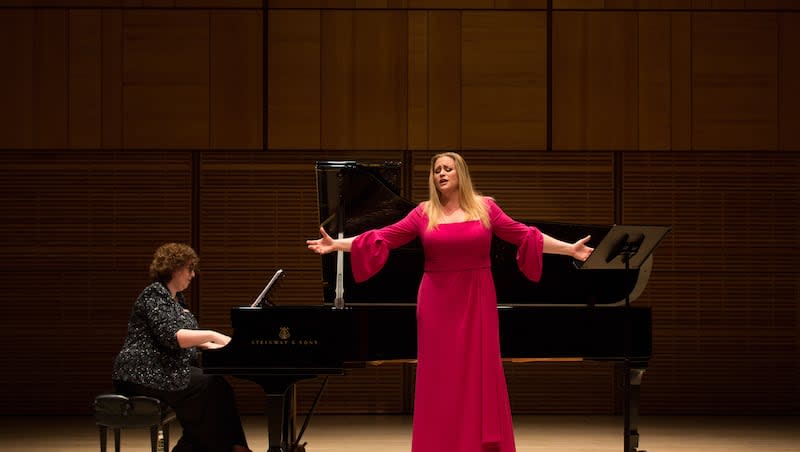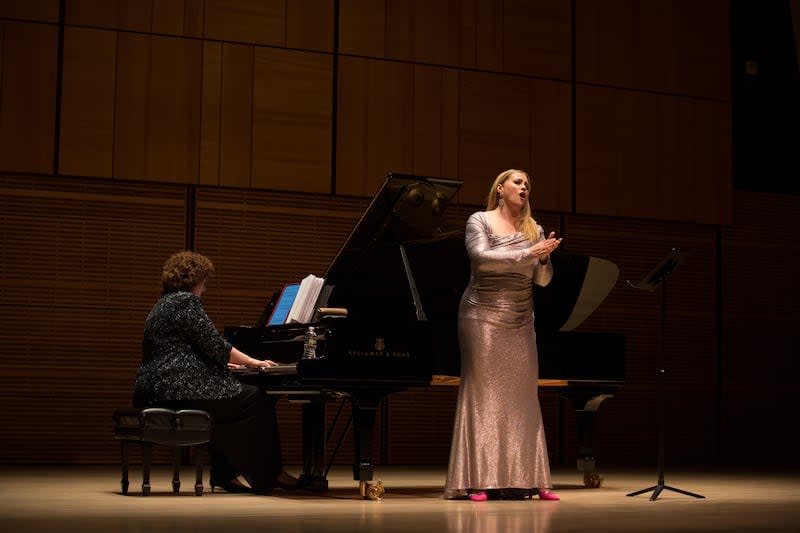From singing in a Subway restaurant to Carnegie Hall, this Latter-day Saint opera star is on a mission

Rachel Willis-Sørensen barely takes a breath when she speaks.
She answers a single question with story after story, sometimes changing her voice to represent different characters. Some stories she’s clearly told before, while others seem to shake off dust and pop into her mind on a whim.
As she talks, she weaves the stories together to illustrate a point. The most fascinating part of it all is that when she gets to a conclusion, she appears to have learned something new about herself.
In just a 30-minute interview, three things become abundantly clear about Willis-Sørensen: She has remarkable lung capacity, a strong knack for storytelling and a belief that life experiences are meant to be revisited and reinterpreted.
And all of that has served her well as an opera singer.
Hailed by LA Opera as “one of the most acclaimed American sopranos of her generation,” the Brigham Young University graduate has won top prizes in prestigious competitions like Metropolitan Opera National Council Auditions and Operalia, and performed throughout the world.
So far, the 2023-24 season has taken her everywhere from Paris to Hong Kong to Germany.
This season also marked her debut at Carnegie Hall, where she recently performed in a special recital presented by the Center for Latter-day Saint Arts, a nonprofit that historian Richard Bushman launched in an effort to celebrate Latter-day Saint creators.
On the day of the solar eclipse — and the day before her Carnegie Hall debut — Willis-Sørensen hopped on a Zoom call with the Deseret News to chat about the significance of the concert, the formative moments that got her to this point in her career and her efforts to make opera more accessible.
Intertwining music and faith
In the now-demolished Harris Fine Arts Center on BYU’s campus, a large picture of opera star Ariel Bybee hung in one of the recital halls. It’s an image Willis-Sørensen looked at often.
The Latter-day Saint artist, who died in 2018, was renowned for her 18 seasons and over 450 performances at the Metropolitan Opera, as the Deseret News previously reported. She sang “How Great Thou Art” in front of President Bill Clinton in 1996 and performed at The Church of Jesus Christ of Latter-day Saints President Gordon B. Hinckley’s 90th birthday celebration.
Willis-Sørensen never got to meet Bybee. But her Carnegie Hall debut makes her feel a strong connection with the artist.
At the concert, Willis-Sørensen premiered a newly commissioned piece titled “Amaranthine” from fellow BYU grad and composer S. Andrew Lloyd, who won the Center for Latter-day Saint Arts’ 2022 Ariel Bybee Endowment prize.
“I Fled Him,” from S. Andrew Lloyd’s song cycle “Amaranthine!” World premiere, Carnegie Hall, April 9th, 2024 Pianist: Tamar Tatasanikidze
Posted by Rachel Willis-Sørensen on Thursday, April 11, 2024
The endowment was established to honor Bybee, a longtime advocate for Latter-day Saint arts. And the Carnegie Hall concert as a whole was an exercise in narrowing the divide between faith-inspired works and the greater arts community — something Bybee frequently exemplified, Willis-Sørensen said.
“I’ve never met her but I’ve always revered her,” she said. “So to be able to have in a small way a part of that legacy, that feels really special to me to feel connected to her and everything that she was able to accomplish.”
When done right, Willis-Sørensen said, a performance can be “a conduit of something bigger than me that exists.” And she believes that, in part, because faith has strongly informed her own career.
The opera singer said serving an 18-month mission for The Church of Jesus Christ of Latter-day Saints in Germany ultimately placed her in a better position on the path to success.
“I just found that I had been focusing on it (my career) in this almost destructive, perfection-mongering way, and (on the mission) it was like I could sort of relax that focus,” she said. “And it enabled me to sing in a more direct, honest, devoid of tension kind of way. It really improved.”
Less than a month after returning from her mission, Willis-Sørensen ended up winning a BYU singing competition. One of the judges was then-BYU professor Darrell Babidge, who is now chair of the voice faculty at The Juilliard School.
Willis-Sørensen began studying with Babidge, and the two remain close today. She described Babidge as a “significant mentor” who holds her to a high standard, but does it “from a place of love and acceptance.”
That’s something she has tried to emulate as she works with the next generation of rising opera stars.
In fact, while in New York for her Carnegie Hall performance, Willis-Sørensen and Babidge hosted a master class for select vocal students from BYU and the University of Texas San Antonio.
But Willis-Sørensen isn’t just interested in teaching students who already have an interest in opera. She wants to share the art form with just about anyone she comes across — especially people who believe opera isn’t for them.
Spreading a love of opera
Willis-Sørensen has a palpable passion for opera, and music at large, but she isn’t oblivious to some of the hurdles the art form faces. Due to a number of reasons — including expensive tickets and often being presented in a foreign language — opera is commonly perceived as being elitist and inaccessible, Willis-Sørensen said.
Through her social media, Willis-Sørensen works to actively combat that. She regularly posts snippets of her rehearsals and performances, and shares videos about the roles she’s performing and how she prepares for them. It’s a way to connect and, she hopes, lessen the distance between audiences and the stage.
“I somehow see it kind of like my task to try to make opera as accessible to people, because I believe it really is and can be,” she said. “The art form … it can feel inaccessible to people. It has all these inherent, you could argue, problems.
“But at the end of the day, it also has this power and I feel so deeply for it and with it.”

One of the first times she realized that was when she was painting a closet.
She was a teenager, helping her voice teacher in her hometown of Richland, Washington, get ready to sell her house. Through the walls, she could hear her teacher singing an aria from Camille Saint-Saëns’ “Samson and Delilah.”
Maybe it was the paint fumes, Willis-Sørensen joked, but she began to cry.
“I couldn’t believe how beautiful it was,” she said. “It was like coming out of me. Somehow she’s singing it, but it’s in me.”
A couple of years later, when she was 19 and working at a Subway restaurant in between semesters at BYU, Willis-Sørensen found herself belting out the aria “Quando m’en vo’” from “La boheme” following the lunch rush. A customer had been talking to her during the lull, and upon learning she was training to be an opera singer, requested she sing something.
One of Willis-Sørensen’s co-workers, who wasn’t particularly interested in hearing opera, left the sandwich line and went in the back. Following the impromptu performance — which was almost 20 years ago to the day — Willis-Sørensen received a generous tip from the customer. And then she went in the back to get more tomatoes.
On the other side of the wall, she found her co-worker sitting on an overturned bucket with his head down, resting his elbows on his knees. He looked up when she came in, and it looked like he’d been crying.
“Is that opera?” she recalled him asking. “I’ve never heard anything like that.”
It’s a moment Willis-Sørensen said she cleaves to, because it showed her that opera really can reach people in the most unexpected of places.
“I’m not saying that it has to appeal to everyone — it certainly doesn’t,” Willis-Sørensen said. “But it has its place. But ... if the only person that it helps is me, it’s still worth doing. I mean, I love it that much.”

